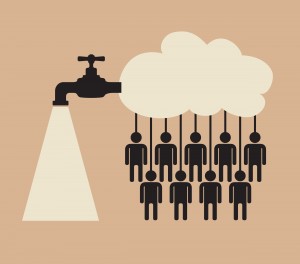
The #UnderstandingPsychosis blog we published last week has quickly become the most popular post in the history of this site. It has also been quite a controversial blog, which has resulted in some vitriolic and emotive outbursts on Twitter.
Having had a few days to let the dust settle, I thought it was a good time to reflect on what has happened over the last few days. Today’s blog is not about the content of the Division of Clinical Psychology report, it’s about the process we went through to produce our response, the ensuing discussion that took place on this blog and on Twitter, and the role that the Mental Elf plays in the ongoing debate about mental health evidence.
Psychology versus psychiatry?
One of the most disappointing aspects of the debate that’s taken place over the last few days, is that it has sometimes turned into a bun fight between what some view as the opposing models of psychology and psychiatry. There have been inappropriate and abusive comments from many directions and we hope that these can be minimised or completely avoided in future.
Samei Huda explored this issue in his contribution to the blog and in his subsequent comments. I’m in agreement with Samei that the psychological and medical models are complementary. This seems an obvious point but one worth making; that service users will benefit most by being offered a range of services and treatment options, although clearly we need to have reliable evidence to support the use of these services and treatments.
The impression I had a number of times during the (sometimes heated) debate on Twitter, was that old battle lines were appearing and that the opposing camps of psychologists and psychiatrists just needed a few emotional buttons to be pressed before they donned their war paint and ran screaming into the skirmish.
Thankfully there were far more conciliatory voices than aggressive ones, but it’s sometimes hard to be calm and placatory when the tweets are flying!

Put down your pies guys.
The pros and cons of social media
This leads me on nicely to one of the most surprising aspects of the whole experience; that being how different people have responded to the use of Twitter in the context of this #UnderstandingPsychosis debate.
As our regular readers know, we elves love Twitter! We’ve used it for years and have been huge advocates of it, largely because (in our experience) it is one of the few places where everyone has a voice. This is especially important in the world of mental health, where service users, carers and sometimes professionals struggle to be heard, to take control and to engage in conversations about care.
We have found social media especially powerful when it comes to gaining access to the filter bubbles of other communities and bringing together traditionally disconnected groups of people. Our most successful blogs have provided a platform for service users, clinicians, researchers, bloggers and others to discuss mental health research, on a level playing field. That has sometimes resulted in really quite marvellous insights for our readers and for those of us running the website.
You can understand our surprise when we received a tweet last week suggesting that the discussion should stop on Twitter and should instead take place in journals and at conferences. I hope that the hugely negative response to this suggestion from our followers will help persuade those who hold this view that social media is a positive tool if it is used responsibly.
Although I’m a Twitter fan, I also recognise it is not a perfect system for debate. I’m frustrated by it’s limitations on a daily basis and I’m learning how to use it more effectively all the time. As an aside, we plan to run more webinars on the Mental Elf next year, as we believe that meeting people with audio and video will provide a far richer format for discussion.

Let’s keep using social media in a positive and constructive way to learn from each other.
What is the Mental Elf?
Many people have challenged us over the last few days. We have been accused of writing a biased critique of the #UnderstandingPsychosis report, of focusing too much on the negatives, and of siding with the psychiatric model (whatever that means!).
We asked two psychiatrists (Alex Langford and Samei Huda) and one psychologist (Keith Laws) to write our blog, playing to their strengths and their areas of expertise. Some have said this is unbalanced given the subject of the report. I would argue that the #UnderstandingPsychosis report itself had a rather skewed team of people working on it; exclusively psychologists and service users. Now clearly, service users and psychologists need to be well represented on any group writing a report about psychosis, but surely psychiatrists and nurses and social workers and others also have a part to play?
The aim of this website has always been to help people keep up to date with new evidence and to provide personal and expert views of the strengths and weaknesses of that evidence. We select dozens of items each week that we could write about from a huge stream of guidance, research, policy documents and reports that rain down on the woodland. We choose stuff that we think will be relevant to mental health practice (primarily in the UK) and what we select is often (but not always) what you would call the best available evidence in the field.
Sometimes a piece of evidence comes along that we view as important but flawed. This was the case with the #UnderstandingPsychosis report, which clearly has a great deal of useful and relevant information for service users, health and social care professionals of all backgrounds.
We chose in our blog to highlight the limitations of the report and deal with three specific areas that we felt needed clarification (CBT, medication and the psychological/biological models). Our decision to present an alternative view on these topics was informed by our knowledge of the existing research evidence. We felt that the report did not present an evidence-based summary of these issues and so we sought to pick up on these limitations.
We highlight the limitations of research every week and sometimes this becomes the main purpose of the blog. We’ve tagged many of these blogs with ‘Unfounded Claims’ so you can peruse previous pieces in this vein.

Critical appraisal will always be a core part of what we do.
Crowdsourcing our peer review
Perhaps the most satisfying part of running this website for the last 3 years has been seeing the way that a community has grown up around the elf. We now have thousands of people reading our blogs and tweets every day, but more than that we have an active, discerning and passionate group of individuals who want to engage with the evidence.
When we publish controversial blogs as we did last week, the response is instant and the community quickly tell us what they think. This is often a no holds barred, heartfelt response from people who have lived with a mental health condition for years. Sometimes it’s an angry reply from a professional who resents that we are ‘misrepresenting’ or ‘undervaluing’ their preferred method of treatment. We recognise the sensitivities that exist and do our best to take these into account when blogging and tweeting. However, our primary duty is to present the strengths and limitations of the evidence in front of us, by applying reliable critical appraisal techniques and summarising the material in a usable format. That’s what elves are good at and that’s what we will continue to do.
The joy of social media is that we have a diverse, international audience to get involved as peer reviewers of our work. If we make a mistake, forget to include some vital information or ignore an interesting critical angle, we hear about it pretty quick! Unlike journal articles we can make instant changes and keep an audit trail of the discussion and the adjustments.

Pure, clean, unbiased knowledge is easier to tap into with the power of the crowd behind it.
Thank you and keep on elfing
So, big thanks once again to Keith Laws, Alex Langford and Samei Huda for writing the #UnderstandingPsychosis blog last week, and for participating so thoughtfully in the Twitter discussion that followed and is still ongoing.
Thank you also to everyone who read the original blog and made it to the end of this reflective piece from me. I hope it has encouraged you to engage more with evidence and strengthened your resolve to join in with future discussions like this. As always, if you have a comment, please leave it below or contact me via Twitter.
It’s not a new thought, but I am left with further resolve to work more collaboratively in future. We are all in this together and we will improve care most effectively if we recognise that fact and work to achieve shared goals.

Reflections on #UnderstandingPsychosis: Something a bit different today; a reflective blog from André Tomlin w… http://t.co/Kly6mJFV2Q
RT @Mental_Elf: Reflections on #UnderstandingPsychosis http://t.co/RLKXobptn0 <– Good read.
RT @Mental_Elf: Reflections on #UnderstandingPsychosis http://t.co/70bNoU3cil
@Mental_Elf Well written response to all the furore André!
Paula Gardiner liked this on Facebook.
Very good reflective piece from @Mental_Elf on the recent #understandingpsychosis mud-slinging. Keep up good work! http://t.co/kOd55JdL9S
In France a small group of brave GPs went to the highest adm court & won against a biaised equivalent of NICE abt dementia TT @Mental_Elf
A Fch @Keith_Laws DrIF exposed Benfluorex conflicts of interest costing lives & a former chair of “our NICE risk jail now ….@Mental_Elf
….with some SERVIER executives & a great scientist ex INSERM chair (our med research body) Conflicts of interests cost lives. @Mental_Elf
I see @Keith_Laws as a scientist earning abuses & tentatives of intimidations for denouncing That CBPp might cost lives like.. @Mental_Elf
I FrachonMD suffered accusations of making MDs look bad & panicking patients with her stories of Benfluorex killings @Mental_Elf @Keith_Laws
My opinion is that many patients with psychosis might die by suicide to go to prison& many carers will suffer from this report. @Mental_Elf
Many patients having taken #Mediator were numerous at wanting to believe that IF the brave whistle blower was wrong. @Mental_Elf @Keith_Laws
Even now with the judges working hard on the case some claim that Benfluorex isn’t cardio toxic & Dr Frachon a trouble maker @Mental_Elf
any whistle blower in medicine or psychology will suffer patients with ostrich attitudes or vindicative ones 1/2 @Mental_Elf @Keith_Laws
Today @andretomlin considers the impact of the #UnderstandingPsychosis blog by @Keith_Laws @PsychiatrySHO @SameiHuda http://t.co/tF3wpT5T8B
Most prof take the Pilate Stance against the whistle blower @GeorgiaBelam is unprofessional in encouraging T Hate @Keith_Laws @Mental_Elf
To sustain whistle blowers like @Keith_Laws on CBTp or @thus_spake_z on sexual abuses by therapists isn’easy but is a prof duty. @Mental_Elf
Princess Sunshyne liked this on Facebook.
What I called hate tweet encouraged by @GeorgiaBelam is exposed at @whatsnewonearth you might find it only insulting @Mental_Elf @Keith_Laws
I am experience in hate campaign agst whistle blowers since my ex-husband Pr François Lemaire’s was involved in research ethics @Mental_Elf
And I know in detail what ‘s happened to Dr Frachon which is now public since a first trial hearing has been held #Mediator 1/ @Mental_Elf
I am also a whistle blower myself against a Paris medical council who protects sexual abusers and rapists MDs since 2008. @Mental_Elf
I know how the raped IVF pts plaintiff agst IVF doc Andre Hazout now jailed for 8 yrs in 02 14 where insulted on the Internet @Mental_Elf
Up to the days of the trial since I was there mostly to take one plaintiff to lunch spending 2 hours in support agst hate …..@Mental_Elf
…speech toward the plaintifs from other former patients of the rapist who were making loud laughs at barrister’s jokes! @Mental_Elf
doc serial rapist Hazout would be still raping desperate for child women since the Paris me council protected him for 20 yrs.. @Mental_Elf
..without an orthopedist surgeon whistle blower Hervé Poitevin whose wife Cécile Poitevin had been sex. He had to …assaulted @Mental_Elf
…to stop practicing in Paris and go South because that whistle blower has been persecuted by med council up to be disciplined @Mental_Elf
He received a blame for looking on the Internet for other victims of rape&sexual assault frm serial rapist #Hazout now in jail @Mental_Elf
Whistleblowers H Poitevin&I Frachon suffered hatred menacing now IMO @Keith_Laws Any pro has a duty to stop it ! @Mental_Elf @WesselyS
We will have a debate on CBTp at the EPA 2015 I will write a restricted access blogpost on this story of whistle blowing. @Mental_Elf
I will submit a 3rd com on the previous post you did great in making happens although with an error in casting/end. @Mental_Elf @Keith_Laws
I Forget to reminds the hatred against a couple of brave nurses & one nurse-helper who took turn to find proofs … @Mental_Elf @Keith_Laws
..about #Bonnemaison MD puting pts he didn’t know to death when taking opiates for his own use.Those whistle blo.. @Mental_Elf @Keith_Laws
..have been repeatedly insulted in every way up to sexual revenge bc the killerdoc had an affair with another nurse @Mental_Elf @Keith_Laws
Same part of France recently a Brit new mother died bc a v drunk Belgian anesthetist intubated the esophagus … @Mental_Elf @Keith_Laws
The inquest is showing it was clear the alcohol addicted MD was unfit to practice & had already had pbs taking care @Mental_Elf @Keith_Laws
“Put down the pies guys! The psychological & medical models are complementary” Reflections on #UnderstandingPsychosis http://t.co/70bNoU3cil
Reflections on #UnderstandingPsychosis http://t.co/IXUwXnFt1J via @Mental_Elf
Your Brain Health liked this on Facebook.
June Dunnett liked this on Facebook.
Heated debate, filter bubbles & calls to stop using Twitter. Reflections on #UnderstandingPsychosis http://t.co/tF3wpT5T8B
@Mental_Elf “Unlike journal articles we…keep audit trail of discussion/adjustments”. We link items/use Crossmark to track corrections &c.
..of other pts How to expect nurses or MDs to become whistle blowers when #bonnemaison trial has shown WB to be insulted? @Mental_Elf
“Critical appraisal will always be a core part of what we do” Reflections on #UnderstandingPsychosis http://t.co/tF3wpT5T8B
Why and how THAT blog was created http://t.co/lpTjf8prFD
Mental Elf: Reflections on #UnderstandingPsychosis http://t.co/KOvdFSDXmS
Laurie Flynn liked this on Facebook.
Crowdsourcing our peer review. Reflections on #UnderstandingPsychosis http://t.co/tF3wpT5T8B
What is the scope of asking to discuss about data only in academia circles when conflicts of interest around CBTp in England make Nice insensible to academic research data and conclusions unlike his Scottish equivalent ?
To keep conflicts of interest undisturbed ?
To keep a low profile on the dreadful academic quality of some anti science English academics unable to understand the basics of statistics and how EBM works in a country pretending to have it ruling public spendings in health care, or the interest of recent genetic discovery in schizophrenia?
To keep professorship and research grants to people with little academic abilities when Oxford and Imperial College high standard scientific professors risk to get sacked for not being productive enough, not in research quality but in grant money?
( One is rumored to have been pushed to suicide and for sure was under stress not for not giving the country good precious research results but for not receiving enough grant money?)
Expert by opinion is what we often are in clinical practice when current EBM doesn’t please us and EBM can change, it is a work in progress but very capable people and scientifically knowledgeable ones are needed to change it.
For light cases it doesn’t matter much how one tries to do best for patients providing them with confort in chronic illness or transient one trying to respect their beliefs but psychosis isn’t light and people often die by suicide.
Don’t miss: Reflections on #UnderstandingPsychosis http://t.co/tF3wpT5T8B
@Mental_Elf Excellent piece Andre. Keep it up man!
Very good “@Mental_Elf: Don’t miss: Reflections on #UnderstandingPsychosis http://t.co/9giCDaTSxy”
Amanda Collins-Eade liked this on Facebook.
I write as an onlooker who works in a related field.
I think we can all agree that the debate sparked by the publication of Understanding Psychosis has plumbed some pretty awful depths (although let’s not lose sight of the fact that this groundbreaking report has been strongly welcomed overall).
But I’m not entirely happy with Mental Elf’s reflection. The most unhelpful part is the subtle (deliberate?) slide from ‘psychology vs psychiatry models’ (fairly accurate, although actually the report calls for a psychosocial model) to ‘psychologists vs psychiatrists.’ The other side of the coin from the extraordinarily aggressive responses by (some) defenders of psychiatric models was, in my view, the admirable restraint shown by the report’s authors – and from their colleagues. In fact, one of the charges levelled against them was that they were NOT responding – despite what seemed to be numerous provocations.
And let’s not forget the (inconvenient to some) fact that the report was launched and endorsed by two of the most senior psychiatrists in the country. So, I would argue that at least in relation to the recent debate, it is both untrue and unhelpful to talk about an interprofessional war. No wonder service users get upset if they are constantly told that this is what is going on. Why, then, do (some) people in responsible positions continue to promote this narrative? Well, I don’t think it’s too cynical to speculate that this serves as a convenient way of defusing challenges to entrenched positions and vested interests. Far easier to depict these uncomfortable but necessary critiques as some kind of narrow professional spat, and call for everyone to behave themselves – which is thinly disguised code for ‘Don’t dare challenge the status quo. ‘
An equally cheap trick is to characterise a call for more considered discussion as if it was an attempt to silence people. I am sorry to see Mental Elf repeating this unjustified reading of Prof Hacker Hughes’ tweet, along with Ben Goldacre’s apparent attempt to make mischief out of it. A more responsible strategy would have been to check your interpretation with Prof Hacker Hughes before disseminating a distortion that was bound to cause anger and alarm. Neither you nor Goldacre come out of this at all well. In fact a number of people have told me of their dismay that previously respected sources have been so willing to abandon the principles of evidence and fair debate when the issues get too close to home.
I’ve waited many years for these important critiques to reach the mainstream. I am extremely grateful to the authors of Understanding Psychosis for their contribution to this process. I do not intend to be distracted by red herrings and irrelevant rhetoric, and neither, I hope, will others be.
Our most popular blog this week? @andretomlin’s reflections on #UnderstandingPsychosis http://t.co/tF3wpT5T8B
This is good RT @Mental_Elf: Our most popular blog this week? @andretomlin’s reflections on #UnderstandingPsychosis http://t.co/ekAFXMLOas“
Robert Freudenthal liked this on Facebook.
Comment from ‘an observer’ provides vital analysis on alleged ‘turf wars’: Reflections on #UnderstandingPsychosis http://t.co/OURfY8eitE
I do not intend to engage in further debate. You have been caught bang to rights, and I think you know it. I suggest you draw a line under this whole sorry episode and your less than honourable part in it.
[…] around psychological treatments over pharmacological. However, despite a lot of recent tribalism (See Mental Elf’s brilliant reflections on the issue here) I firmly believe healthcare benefits from plurality, and people should have a choice of […]